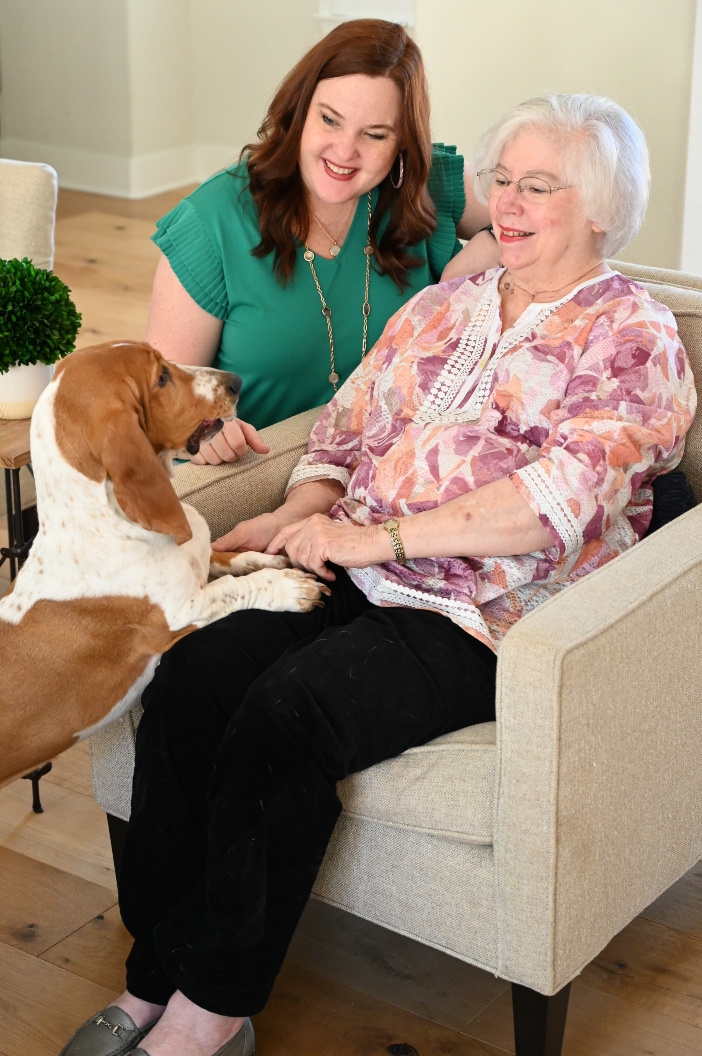Alzheimer’s and dementia impact women disproportionately.
By Shanna Howard, Photos by Cheryl Bemis | Bemis Digital Media
Almost two-thirds of Americans with Alzheimer’s are women—as are two-thirds of their caregivers. A third of those caregivers are the daughters of those living with Alzheimer’s.
Sandwich Generation
A quarter of dementia caregivers care for their parents while also raising their own children. Jennifer Prescott, RN, MSN, co-owner of Blue Water Homecare and Hospice, is part of this sandwich generation. Her mother-in-law joined the household after a dementia diagnosis.
“I’m pulled in a million different directions: assisting my mother-in-law, raising four children, being a wife and then the responsibilities that come with owning a fast-growing health care organization,” she says.
Prescott became involved with the Alzheimer’s Association as a volunteer community educator and board member. “Even as a nurse, I craved knowledge on dementia and how to successfully care for someone with this disease that has no cure,” she says. “I began to feel isolated and frustrated with the daunting task of balancing work and family.”
Caregiving and Purpose
Jennifer Marchand, event coordinator/promoter for Bleu French Laundry Productions, left Austin to help her father care for her mother, whose memory loss led to a dementia diagnosis followed by mobility issues and a Parkinson’s diagnosis.
“I was in an exciting new job and sad to leave it. But my love for my parents is the most important thing, so it wasn’t a sacrifice,” she says. “I wanted to help any way I could.”
Marchand later helped her father manage a move and became a caregiver for both her parents after he had a stroke. Medication management was a challenge as was finding a home health caregiver, which she ultimately took on. She says it’s an enormous job taking care of your loved
ones 24/7.
“I felt a bit lost because I knew nothing about senior care, and the idea was to get professional help. It was a whole new world of trying to navigate through all of these new issues piling up on one another.”
Marchand found respite listening to music and working in an antique shop part time while her sister assisted. “Any way you can give yourself a mental and emotional break, do it. You can’t be everywhere at once. Do the best you can, and know that the fact that you care and are there for your loved one is really the most important thing.”

Dementia outreach and fundraising became Marchand’s mission. A longtime events and PR professional, she held a successful Rolling Stones Hoot Night at the Continental Club last December, one in a series of fundraising concerts she’s done for the Alzheimer’s Association in honor of her late mom.
“When I see someone I love struggle, the first thing I think is, ‘How can I help?’ I decided to take this feeling of helplessness and turn it into productive energy and try to help find a solution.”
Hope and Healing
Courtney Joyner lost her mother—a talented artist—to dementia last year. Joyner followed her mom’s artistic and entrepreneurial spirit as a self-taught ceramic artist, leaving the corporate world and opening Brush Strokes Pottery. Her mom sent ideas and attended events with her.
“I’m glad I have those memories of her being able to participate in the business with me. It makes me really tearful because I want her here now, but I have to just remind myself that she did see it, and she is watching over me.”
A portion of the proceeds from the purple cacti she sells benefits the Alzheimer’s Association. “I didn’t seek it out to do specifically for dementia. It just spoke to me that this is the next color you should try to do. Once it came to fruition, I was like, ‘Oh, okay, this is for mom.’”
Soon she began to connect with others affected by Alzheimer’s through her work. “This is something that is not talked about, and I want to talk about it. We shouldn’t be scared to be vulnerable about this. I think there is power in knowing other people are going through this,” Joyner says. “As hard as it is sometimes for me to talk about it, I feel like it’s what I’m supposed to be doing right now. I know [Mom’s] like, ‘I am so proud of you, and this is exactly what I want you to do.’”
Visit the Alzheimer’s Association to find resources for those dealing with and helping those with Alzheimer’s and dementia.


